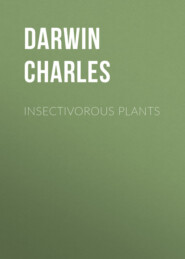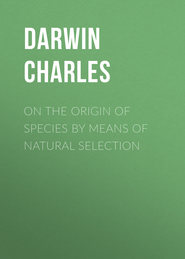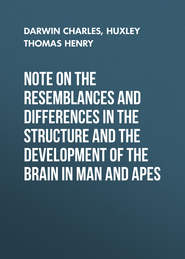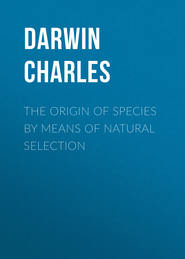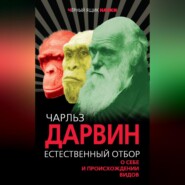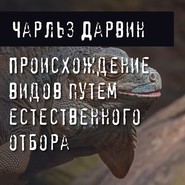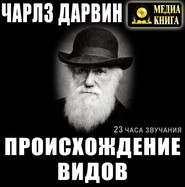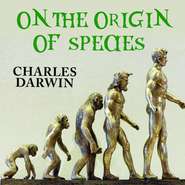По всем вопросам обращайтесь на: info@litportal.ru
(©) 2003-2025.
✖
Life and Letters of Charles Darwin — Volume 1
Настройки чтения
Размер шрифта
Высота строк
Поля
Mr. Archibald Geikie has been so good as to allow me to quote a passage from a letter addressed to me (November 19, 1884) in compliance with my request for his opinion on the character of my father's Glen Roy work: —
"Mr. Darwin's 'Glen Roy' paper, I need not say, is marked by all his characteristic acuteness of observation and determination to consider all possible objections. It is a curious example, however, of the danger of reasoning by a method of exclusion in Natural Science. Finding that the waters which formed the terraces in the Glen Roy region could not possibly have been dammed back by barriers of rock or of detritus, he saw no alternative but to regard them as the work of the sea. Had the idea of transient barriers of glacier-ice occurred to him, he would have found the difficulties vanish from the lake-theory which he opposed, and he would not have been unconsciously led to minimise the altogether overwhelming objections to the supposition that the terraces are of marine origin."
It may be added that the idea of the barriers being formed by glaciers could hardly have occurred to him, considering what was the state of knowledge at the time, and bearing in mind his want of opportunities of observing glacial action on a large scale.
The latter half of July was passed at Shrewsbury and Maer. The only entry of any interest is one of being "very idle" at Shrewsbury, and of opening "a note-book connected with metaphysical inquiries." In August he records that he read "a good deal of various amusing books, and paid some attention to metaphysical subjects."
The work done during the remainder of the year comprises the book on coral reefs (begun in October), and some work on the phenomena of elevation in S. America.]
CHARLES DARWIN TO C. LYELL. 36 Great Marlborough Street, August 9th [1838].
My dear Lyell,
I do not write to you at Norwich, for I thought I should have more to say, if I waited a few more days. Very many thanks for the present of your 'Elements,' which I received (and I believe the VERY FIRST copy distributed) together with your note. I have read it through every word, and am full of admiration of it, and, as I now see no geologist, I must talk to you about it. There is no pleasure in reading a book if one cannot have a good talk over it; I repeat, I am full of admiration of it, it is as clear as daylight, in fact I felt in many parts some mortification at thinking how geologists have laboured and struggled at proving what seems, as you have put it, so evidently probable. I read with much interest your sketch of the secondary deposits; you have contrived to make it quite "juicy," as we used to say as children of a good story. There was also much new to me, and I have to copy out some fifty notes and references. It must do good, the heretics against common sense must yield...By the way, do you recollect my telling you how much I disliked the manner — referred to his other works, as much as to say, "You must, ought, and shall buy everything I have written." To my mind, you have somehow quite avoided this; your references only seem to say, "I can't tell you all in this work, else I would, so you must go to the 'Principles'"; and many a one, I trust, you will send there, and make them, like me, adorers of the good science of rock-breaking. You will see I am in a fit of enthusiasm, and good cause I have to be, when I find you have made such infinitely more use of my Journal than I could have anticipated. I will say no more about the book, for it is all praise. I must, however, admire the elaborate honesty with which you quote the words of all living and dead geologists.
My Scotch expedition answered brilliantly; my trip in the steam-packet was absolutely pleasant, and I enjoyed the spectacle, wretch that I am, of two ladies, and some small children quite sea-sick, I being well. Moreover, on my return from Glasgow to Liverpool, I triumphed in a similar manner over some full-grown men. I stayed one whole day in Edinburgh, or more truly on Salisbury Craigs; I want to hear some day what you think about that classical ground, — the structure was to me new and rather curious, — that is, if I understand it right. I crossed from Edinburgh in gigs and carts (and carts without springs, as I never shall forget) to Loch Leven. I was disappointed in the scenery, and reached Glen Roy on Saturday evening, one week after leaving Marlborough Street. Here I enjoyed five [?] days of the most beautiful weather with gorgeous sunsets, and all nature looking as happy as I felt. I wandered over the mountains in all directions, and examined that most extraordinary district. I think, without any exceptions, not even the first volcanic island, the first elevated beach, or the passage of the Cordillera, was so interesting to me as this week. It is far the most remarkable area I ever examined. I have fully convinced myself (after some doubting at first) that the shelves are sea-beaches, although I could not find a trace of a shell; and I think I can explain away most, if not all, the difficulties. I found a piece of a road in another valley, not hitherto observed, which is important; and I have some curious facts about erratic blocks, one of which was perched up on a peak 2200 feet above the sea. I am now employed in writing a paper on the subject, which I find very amusing work, excepting that I cannot anyhow condense it into reasonable limits. At some future day I hope to talk over some of the conclusions with you, which the examination of Glen Roy has led me to. Now I have had my talk out, I am much easier, for I can assure you Glen Roy has astonished me.
I am living very quietly, and therefore pleasantly, and am crawling on slowly but steadily with my work. I have come to one conclusion, which you will think proves me to be a very sensible man, namely, that whatever you say proves right; and as a proof of this, I am coming into your way of only working about two hours at a spell; I then go out and do my business in the streets, return and set to work again, and thus make two separate days out of one. The new plan answers capitally; after the second half day is finished I go and dine at the Athenaeum like a gentleman, or rather like a lord, for I am sure the first evening I sat in that great drawing-room, all on a sofa by myself, I felt just like a duke. I am full of admiration at the Athenaeum, one meets so many people there that one likes to see. The very first time I dined there (i.e. last week) I met Dr. Fitton (W.H. Fitton (1780-1861) was a physician and geologist, and sometime president of the Geological Society. He established the 'Proceedings,' a mode of publication afterwards adopted by other societies.) at the door, and he got together quite a party — Robert Brown, who is gone to Paris and Auvergne, Macleay [?] and Dr. Boott. (Francis Boott (1792-1863) is chiefly known as a botanist through his work on the genus Carex. He was also well-known in connection with the Linnean Society of which he was for many years an office-bearer. He is described (in a biographical sketch published in the "Gardener's Chronicle", 1864) as having been one of the first physicians in London who gave up the customary black coat, knee-breeches and silk stockings, and adopted the ordinary dress of the period, a blue coat with brass buttons, and a buff waiscoat, a costume which he continued to wear to the last. After giving up practice, which he did early in life, he spent much of his time in acts of unpretending philanthropy.) Your helping me into the Athenaeum has not been thrown away, and I enjoy it the more because I fully expected to detest it.
I am writing you a most unmerciful letter, but I shall get Owen to take it to Newcastle. If you have a mind to be a very generous man you will write to me from Kinnordy (The house of Lyell's father.), and tell me some Newcastle news, as well as about the Craig, and about yourself and Mrs. Lyell, and everything else in the world. I will send by Hall the 'Entomological Transactions,' which I have borrowed for you; you will be disappointed in — 's papers, that is if you suppose my dear friend has a single clear idea upon any one subject. He has so involved recent insects and true fossil insects in one table that I fear you will not make much out of it, though it is a subject which ought I should think to come into the 'Principles.' You will be amused at some of the ridiculo-sublime passages in the papers, and no doubt will feel acutely a sneer there is at yourself. I have heard from more than one quarter that quarrelling is expected at Newcastle (At the meeting of the British Association.); I am sorry to hear it. I met old — this evening at the Athenaeum, and he muttered something about writing to you or some one on the subject; I am however all in the dark. I suppose, however, I shall be illuminated, for I am going to dine with him in a few days, as my inventive powers failed in making any excuse. A friend of mine dined with him the other day, a party of four, and they finished ten bottles of wine — a pleasant prospect for me; but I am determined not even to taste his wine, partly for the fun of seeing his infinite disgust and surprise...
I pity you the infliction of this most unmerciful letter. Pray remember me most kindly to Mrs. Lyell when you arrive at Kinnordy. I saw her name in the landlord's book of Inverorum. Tell Mrs. Lyell to read the second series of 'Mr. Slick of Slickville's Sayings.'...He almost beats "Samivel," that prince of heroes. Goodnight, my dear Lyell; you will think I have been drinking some strong drink to write so much nonsense, but I did not even taste Minerva's small beer to-day.
Yours most sincerely, CHAS. DARWIN.
CHARLES DARWIN TO C. LYELL. Friday night, September 13th [1838].
My dear Lyell,
I was astonished and delighted at your gloriously long letter, and I am sure I am very much obliged to Mrs. Lyell for having taken the trouble to write so much. (Lyell dictated much of his correspondence.) I mean to have a good hour's enjoyment and scribble away to you, who have so much geological sympathy that I do not care how egotistically I write...
I have got so much to say about all sorts of trifling things that I hardly know what to begin about. I need not say how pleased I am to hear that Mr. Lyell (Father of the geologist.) likes my Journal. To hear such tidings is a kind of resurrection, for I feel towards my first-born child as if it had long since been dead, buried, and forgotten; but the past is nothing and the future everything to us geologists, as you show in your capital motto to the 'Elements.' By the way, have you read the article, in the 'Edinburgh Review,' on M. Comte, 'Cours de la Philosophie' (or some such title)? It is capital; there are some fine sentences about the very essence of science being prediction, which reminded me of "its law being progress."
I will now begin and go through your letter seriatim. I dare say your plan of putting the Elie de Beaumont's chapter separately and early will be very good; anyhow, it is showing a bold front in the first edition which is to be translated into French. It will be a curious point to geologists hereafter to note how long a man's name will support a theory so completely exposed as that of De Beaumont's has been by you; you say you "begin to hope that the great principles there insisted on will stand the test of time." BEGIN TO HOPE: why, the POSSIBILITY of a doubt has never crossed my mind for many a day. This may be very unphilosophical, but my geological salvation is staked on it. After having just come back from Glen Roy, and found how difficulties smooth away under your principles, it makes me quite indignant that you should talk of HOPING. With respect to the question, how far my coral theory bears on De Beaumont's theory, I think it would be prudent to quote me with great caution until my whole account is published, and then you (and others) can judge how far there is foundation for such generalisation. Mind, I do not doubt its truth; but the extension of any view over such large spaces, from comparatively few facts, must be received with much caution. I do not myself the least doubt that within the recent (or as you, much to my annoyment, would call it, "New Pliocene") period, tortuous bands — not all the bands parallel to each other — have been elevated and corresponding ones subsided, though within the same period some parts probably remained for a time stationary, or even subsided. I do not believe a more utterly false view could have been invented than great straight lines being suddenly thrown up.
When my book on Volcanoes and Coral Reefs will be published I hardly know; I fear it will be at least four or five months; though, mind, the greater part is written. I find so much time is lost in correcting details and ascertaining their accuracy. The Government Zoological work is a millstone round my neck, and the Glen Roy paper has lost me six weeks. I will not, however, say lost; for, supposing I can prove to others' satisfaction what I have convinced myself is the case, the inference I think you will allow to be important. I cannot doubt that the molten matter beneath the earth's crust possesses a high degree of fluidity, almost like the sea beneath the block ice. By the way, I hope you will give me some Swedish case to quote, of shells being preserved on the surface, but not in contemporaneous beds of gravel...
Remember what I have often heard you say: the country is very bad for the intellects; the Scotch mists will put out some volcanic speculations. You see I am affecting to become very Cockneyfied, and to despise the poor country-folk, who breath fresh air instead of smoke, and see the goodly fields instead of the brick houses in Marlborough Street, the very sight of which I confess I abhor. I am glad to hear what a favourable report you give of the British Association. I am the more pleased because I have been fighting its battles with Basil Hall, Stokes, and several others, having made up my mind, from the report in the "Athenaeum", that it must have been an excellent meeting. I have been much amused with an account I have received of the wars of Don Roderick (Murchison.) and Babbage. What a grievous pity it is that the latter should be so implacable...This is a most rigmarole letter, for after each sentence I take breath, and you will have need of it in reading it...
I wish with all my heart that my Geological book was out. I have every motive to work hard, and will, following your steps, work just that degree of hardness to keep well. I should like my volume to be out before your new edition of 'Principles' appears. Besides the Coral theory, the volcanic chapters will, I think, contain some new facts. I have lately been sadly tempted to be idle — that is, as far as pure geology is concerned — by the delightful number of new views which have been coming in thickly and steadily, — on the classification and affinities and instincts of animals — bearing on the question of species. Note-book after note-book has been filled with facts which begin to group themselves CLEARLY under sub-laws.
Good night, my dear Lyell. I have filled my letter and enjoyed my talk to you as much as I can without having you in propria persona. Think of the bad effects of the country — so once more good night.
Ever yours, CHAS. DARWIN.
Pray again give my best thanks to Mrs. Lyell.
[The record of what he wrote during the year does not give a true index of the most important work that was in progress, — the laying of the foundation-stones of what was to be the achievement of his life. This is shown in the foregoing letter to Lyell, where he speaks of being "idle," and the following extract from a letter to Fox, written in June, is of interest in this point of view:
"I am delighted to hear you are such a good man as not to have forgotten my questions about the crossing of animals. It is my prime hobby, and I really think some day I shall be able to do something in that most intricate subject, species and varieties."]
1839-1841.
[In the winter of 1839 (January 29) my father was married to his cousin, Emma Wedgwood. (Daughter of Josiah Wedgwood of Maer, and grand-daughter of the founder of the Etruria Pottery Works.) The house in which they lived for the first few years of their married life, No. 12 Upper Gower Street, was a small common-place London house, with a drawing-room in front, and a small room behind, in which they lived for the sake of quietness. In later years my father used to laugh over the surpassing ugliness of the furniture, carpets, etc., of the Gower Street house. The only redeeming feature was a better garden than most London houses have, a strip as wide as the house, and thirty yards long. Even this small space of dingy grass made their London house more tolerable to its two country-bred inhabitants.
Of his life in London he writes to Fox (October 1839): "We are living a life of extreme quietness; Delamere itself, which you describe as so secluded a spot, is, I will answer for it, quite dissipated compared with Gower Street. We have given up all parties, for they agree with neither of us; and if one is quiet in London, there is nothing like its quietness — there is a grandeur about its smoky fogs, and the dull distant sounds of cabs and coaches; in fact you may perceive I am becoming a thorough-paced Cockney, and I glory in thoughts that I shall be here for the next six months."
The entries of ill health in the Diary increase in number during these years, and as a consequence the holidays become longer and more frequent. From April 26 to May 13, 1839, he was at Maer and Shrewsbury. Again, from August 23 to October 2 he was away from London at Maer, Shrewsbury, and at Birmingham for the meeting of the British Association.
The entry under August 1839 is: "During my visit to Maer, read a little, was much unwell and scandalously idle. I have derived this much good, that NOTHING is so intolerable as idleness."
At the end of 1839 his eldest child was born, and it was then that he began his observations ultimately published in the 'Expression of the Emotions.' His book on this subject, and the short paper published in 'Mind,' (July 1877.) show how closely he observed his child. He seems to have been surprised at his own feelings for a young baby, for he wrote to Fox (July 1840): "He [i.e. the baby] is so charming that I cannot pretend to any modesty. I defy anybody to flatter us on our baby, for I defy any one to say anything in its praise of which we are not fully conscious...I had not the smallest conception there was so much in a five-month baby. You will perceive by this that I have a fine degree of paternal fervour."
During these years he worked intermittently at 'Coral Reefs,' being constantly interrupted by ill health. Thus he speaks of "recommencing" the subject in February 1839, and again in the October of the same year, and once more in July 1841, "after more than thirteen months' interval." His other scientific work consisted of a contribution to the Geological Society ('Geol. Soc. Proc.' iii. 1842, and 'Geol. Soc. Trans.' vi), on the boulders and "till" of South America, as well as a few other minor papers on geological subjects. He also worked busily at the ornithological part of the Zoology of the "Beagle", i.e. the notice of the habits and ranges of the birds which were described by Gould.]
CHARLES DARWIN TO C. LYELL. Wednesday morning [February 1840].
My dear Lyell,
Many thanks for your kind note. I will send for the "Scotsman". Dr. Holland thinks he has found out what is the matter with me, and now hopes he shall be able to set me going again. Is it not mortifying, it is now nine weeks since I have done a whole day's work, and not more than four half days. But I won't grumble any more, though it is hard work to prevent doing so. Since receiving your note I have read over my chapter on Coral, and find I am prepared to stand by almost everything; it is much more cautiously and accurately written than I thought. I had set my heart upon having my volume completed before your new edition, but not, you may believe me, for you to notice anything new in it (for there is very little besides details), but you are the one man in Europe whose opinion of the general truth of a toughish argument I should be always most anxious to hear. My MS. is in such confusion, otherwise I am sure you should most willingly if it had been worth your while, have looked at any part you choose...
[In a letter to Fox (January 1841) he shows that his "Species work" was still occupying his mind: —
"If you attend at all to Natural History I send you this P.S. as a memento, that I continue to collect all kinds of facts about 'Varieties and Species,' for my some-day work to be so entitled; the smallest contributions thankfully accepted; descriptions of offspring of all crosses between all domestic birds and animals, dogs, cats, etc., etc., very valuable. Don't forget, if your half-bred African cat should die that I should be very much obliged for its carcase sent up in a little hamper for the skeleton; it, or any cross-bred pigeons, fowl, duck, etc., etc., will be more acceptable than the finest haunch of venison, or the finest turtle."
Later in the year (September) he writes to Fox about his health, and also with reference to his plan of moving into the country: —
"I have steadily been gaining ground, and really believe now I shall some day be quite strong. I write daily for a couple of hours on my Coral volume, and take a little walk or ride every day. I grow very tired in the evenings, and am not able to go out at that time, or hardly to receive my nearest relations; but my life ceases to be burdensome now that I can do something. We are taking steps to leave London, and live about twenty miles from it on some railway."]
1842.
[The record of work includes his volume on 'Coral Reefs' (A notice of the Coral Reef work appeared in the Geograph. Soc. Journal, xii., page 115.), the manuscript of which was at last sent to the printers in January of this year, and the last proof corrected in May. He thus writes of the work in his diary: —
"I commenced this work three years and seven months ago. Out of this period about twenty months (besides work during "Beagle's" voyage) has been spent on it, and besides it, I have only compiled the Bird part of Zoology; Appendix to Journal, paper on Boulders, and corrected papers on Glen Roy and earthquakes, reading on species, and rest all lost by illness."
In May and June he was at Shrewsbury and Maer, whence he went on to make the little tour in Wales, of which he spoke in his 'Recollections,' and of which the results were published as "Notes on the effects produced by the ancient glaciers of Caernarvonshire, and on the Boulders transported by floating Ice." ('Philosophical Magazine,' 1842, page 352.)
Mr. Archibald Geikie speaks of this paper as standing "almost at the top of the long list of English contributions to the history of the Ice Age." (Charles Darwin, 'Nature' Series, page 23.)
The latter part of this year belongs to the period including the settlement at Down, and is therefore dealt with in another chapter.]
CHAPTER 1.VIII. — RELIGION
[The history of this part of my father's life may justly include some mention of his religious views. For although, as he points out, he did not give continuous systematic thought to religious questions, yet we know from his own words that about this time (1836-39) the subject was much before his mind.]
In his published works he was reticent on the matter of religion, and what he has left on the subject was not written with a view to publication. (As an exception may be mentioned, a few words of concurrence with Dr. Abbot's 'Truths for the Times,' which my father allowed to be published in the "Index".)
I believe that his reticence arose from several causes. He felt strongly that a man's religion is an essentially private matter, and one concerning himself alone. This is indicated by the following extract from a letter of 1879: — (Addressed to Mr. J. Fordyce, and published by him in his 'Aspects of Scepticism,' 1883.)
"Mr. Darwin's 'Glen Roy' paper, I need not say, is marked by all his characteristic acuteness of observation and determination to consider all possible objections. It is a curious example, however, of the danger of reasoning by a method of exclusion in Natural Science. Finding that the waters which formed the terraces in the Glen Roy region could not possibly have been dammed back by barriers of rock or of detritus, he saw no alternative but to regard them as the work of the sea. Had the idea of transient barriers of glacier-ice occurred to him, he would have found the difficulties vanish from the lake-theory which he opposed, and he would not have been unconsciously led to minimise the altogether overwhelming objections to the supposition that the terraces are of marine origin."
It may be added that the idea of the barriers being formed by glaciers could hardly have occurred to him, considering what was the state of knowledge at the time, and bearing in mind his want of opportunities of observing glacial action on a large scale.
The latter half of July was passed at Shrewsbury and Maer. The only entry of any interest is one of being "very idle" at Shrewsbury, and of opening "a note-book connected with metaphysical inquiries." In August he records that he read "a good deal of various amusing books, and paid some attention to metaphysical subjects."
The work done during the remainder of the year comprises the book on coral reefs (begun in October), and some work on the phenomena of elevation in S. America.]
CHARLES DARWIN TO C. LYELL. 36 Great Marlborough Street, August 9th [1838].
My dear Lyell,
I do not write to you at Norwich, for I thought I should have more to say, if I waited a few more days. Very many thanks for the present of your 'Elements,' which I received (and I believe the VERY FIRST copy distributed) together with your note. I have read it through every word, and am full of admiration of it, and, as I now see no geologist, I must talk to you about it. There is no pleasure in reading a book if one cannot have a good talk over it; I repeat, I am full of admiration of it, it is as clear as daylight, in fact I felt in many parts some mortification at thinking how geologists have laboured and struggled at proving what seems, as you have put it, so evidently probable. I read with much interest your sketch of the secondary deposits; you have contrived to make it quite "juicy," as we used to say as children of a good story. There was also much new to me, and I have to copy out some fifty notes and references. It must do good, the heretics against common sense must yield...By the way, do you recollect my telling you how much I disliked the manner — referred to his other works, as much as to say, "You must, ought, and shall buy everything I have written." To my mind, you have somehow quite avoided this; your references only seem to say, "I can't tell you all in this work, else I would, so you must go to the 'Principles'"; and many a one, I trust, you will send there, and make them, like me, adorers of the good science of rock-breaking. You will see I am in a fit of enthusiasm, and good cause I have to be, when I find you have made such infinitely more use of my Journal than I could have anticipated. I will say no more about the book, for it is all praise. I must, however, admire the elaborate honesty with which you quote the words of all living and dead geologists.
My Scotch expedition answered brilliantly; my trip in the steam-packet was absolutely pleasant, and I enjoyed the spectacle, wretch that I am, of two ladies, and some small children quite sea-sick, I being well. Moreover, on my return from Glasgow to Liverpool, I triumphed in a similar manner over some full-grown men. I stayed one whole day in Edinburgh, or more truly on Salisbury Craigs; I want to hear some day what you think about that classical ground, — the structure was to me new and rather curious, — that is, if I understand it right. I crossed from Edinburgh in gigs and carts (and carts without springs, as I never shall forget) to Loch Leven. I was disappointed in the scenery, and reached Glen Roy on Saturday evening, one week after leaving Marlborough Street. Here I enjoyed five [?] days of the most beautiful weather with gorgeous sunsets, and all nature looking as happy as I felt. I wandered over the mountains in all directions, and examined that most extraordinary district. I think, without any exceptions, not even the first volcanic island, the first elevated beach, or the passage of the Cordillera, was so interesting to me as this week. It is far the most remarkable area I ever examined. I have fully convinced myself (after some doubting at first) that the shelves are sea-beaches, although I could not find a trace of a shell; and I think I can explain away most, if not all, the difficulties. I found a piece of a road in another valley, not hitherto observed, which is important; and I have some curious facts about erratic blocks, one of which was perched up on a peak 2200 feet above the sea. I am now employed in writing a paper on the subject, which I find very amusing work, excepting that I cannot anyhow condense it into reasonable limits. At some future day I hope to talk over some of the conclusions with you, which the examination of Glen Roy has led me to. Now I have had my talk out, I am much easier, for I can assure you Glen Roy has astonished me.
I am living very quietly, and therefore pleasantly, and am crawling on slowly but steadily with my work. I have come to one conclusion, which you will think proves me to be a very sensible man, namely, that whatever you say proves right; and as a proof of this, I am coming into your way of only working about two hours at a spell; I then go out and do my business in the streets, return and set to work again, and thus make two separate days out of one. The new plan answers capitally; after the second half day is finished I go and dine at the Athenaeum like a gentleman, or rather like a lord, for I am sure the first evening I sat in that great drawing-room, all on a sofa by myself, I felt just like a duke. I am full of admiration at the Athenaeum, one meets so many people there that one likes to see. The very first time I dined there (i.e. last week) I met Dr. Fitton (W.H. Fitton (1780-1861) was a physician and geologist, and sometime president of the Geological Society. He established the 'Proceedings,' a mode of publication afterwards adopted by other societies.) at the door, and he got together quite a party — Robert Brown, who is gone to Paris and Auvergne, Macleay [?] and Dr. Boott. (Francis Boott (1792-1863) is chiefly known as a botanist through his work on the genus Carex. He was also well-known in connection with the Linnean Society of which he was for many years an office-bearer. He is described (in a biographical sketch published in the "Gardener's Chronicle", 1864) as having been one of the first physicians in London who gave up the customary black coat, knee-breeches and silk stockings, and adopted the ordinary dress of the period, a blue coat with brass buttons, and a buff waiscoat, a costume which he continued to wear to the last. After giving up practice, which he did early in life, he spent much of his time in acts of unpretending philanthropy.) Your helping me into the Athenaeum has not been thrown away, and I enjoy it the more because I fully expected to detest it.
I am writing you a most unmerciful letter, but I shall get Owen to take it to Newcastle. If you have a mind to be a very generous man you will write to me from Kinnordy (The house of Lyell's father.), and tell me some Newcastle news, as well as about the Craig, and about yourself and Mrs. Lyell, and everything else in the world. I will send by Hall the 'Entomological Transactions,' which I have borrowed for you; you will be disappointed in — 's papers, that is if you suppose my dear friend has a single clear idea upon any one subject. He has so involved recent insects and true fossil insects in one table that I fear you will not make much out of it, though it is a subject which ought I should think to come into the 'Principles.' You will be amused at some of the ridiculo-sublime passages in the papers, and no doubt will feel acutely a sneer there is at yourself. I have heard from more than one quarter that quarrelling is expected at Newcastle (At the meeting of the British Association.); I am sorry to hear it. I met old — this evening at the Athenaeum, and he muttered something about writing to you or some one on the subject; I am however all in the dark. I suppose, however, I shall be illuminated, for I am going to dine with him in a few days, as my inventive powers failed in making any excuse. A friend of mine dined with him the other day, a party of four, and they finished ten bottles of wine — a pleasant prospect for me; but I am determined not even to taste his wine, partly for the fun of seeing his infinite disgust and surprise...
I pity you the infliction of this most unmerciful letter. Pray remember me most kindly to Mrs. Lyell when you arrive at Kinnordy. I saw her name in the landlord's book of Inverorum. Tell Mrs. Lyell to read the second series of 'Mr. Slick of Slickville's Sayings.'...He almost beats "Samivel," that prince of heroes. Goodnight, my dear Lyell; you will think I have been drinking some strong drink to write so much nonsense, but I did not even taste Minerva's small beer to-day.
Yours most sincerely, CHAS. DARWIN.
CHARLES DARWIN TO C. LYELL. Friday night, September 13th [1838].
My dear Lyell,
I was astonished and delighted at your gloriously long letter, and I am sure I am very much obliged to Mrs. Lyell for having taken the trouble to write so much. (Lyell dictated much of his correspondence.) I mean to have a good hour's enjoyment and scribble away to you, who have so much geological sympathy that I do not care how egotistically I write...
I have got so much to say about all sorts of trifling things that I hardly know what to begin about. I need not say how pleased I am to hear that Mr. Lyell (Father of the geologist.) likes my Journal. To hear such tidings is a kind of resurrection, for I feel towards my first-born child as if it had long since been dead, buried, and forgotten; but the past is nothing and the future everything to us geologists, as you show in your capital motto to the 'Elements.' By the way, have you read the article, in the 'Edinburgh Review,' on M. Comte, 'Cours de la Philosophie' (or some such title)? It is capital; there are some fine sentences about the very essence of science being prediction, which reminded me of "its law being progress."
I will now begin and go through your letter seriatim. I dare say your plan of putting the Elie de Beaumont's chapter separately and early will be very good; anyhow, it is showing a bold front in the first edition which is to be translated into French. It will be a curious point to geologists hereafter to note how long a man's name will support a theory so completely exposed as that of De Beaumont's has been by you; you say you "begin to hope that the great principles there insisted on will stand the test of time." BEGIN TO HOPE: why, the POSSIBILITY of a doubt has never crossed my mind for many a day. This may be very unphilosophical, but my geological salvation is staked on it. After having just come back from Glen Roy, and found how difficulties smooth away under your principles, it makes me quite indignant that you should talk of HOPING. With respect to the question, how far my coral theory bears on De Beaumont's theory, I think it would be prudent to quote me with great caution until my whole account is published, and then you (and others) can judge how far there is foundation for such generalisation. Mind, I do not doubt its truth; but the extension of any view over such large spaces, from comparatively few facts, must be received with much caution. I do not myself the least doubt that within the recent (or as you, much to my annoyment, would call it, "New Pliocene") period, tortuous bands — not all the bands parallel to each other — have been elevated and corresponding ones subsided, though within the same period some parts probably remained for a time stationary, or even subsided. I do not believe a more utterly false view could have been invented than great straight lines being suddenly thrown up.
When my book on Volcanoes and Coral Reefs will be published I hardly know; I fear it will be at least four or five months; though, mind, the greater part is written. I find so much time is lost in correcting details and ascertaining their accuracy. The Government Zoological work is a millstone round my neck, and the Glen Roy paper has lost me six weeks. I will not, however, say lost; for, supposing I can prove to others' satisfaction what I have convinced myself is the case, the inference I think you will allow to be important. I cannot doubt that the molten matter beneath the earth's crust possesses a high degree of fluidity, almost like the sea beneath the block ice. By the way, I hope you will give me some Swedish case to quote, of shells being preserved on the surface, but not in contemporaneous beds of gravel...
Remember what I have often heard you say: the country is very bad for the intellects; the Scotch mists will put out some volcanic speculations. You see I am affecting to become very Cockneyfied, and to despise the poor country-folk, who breath fresh air instead of smoke, and see the goodly fields instead of the brick houses in Marlborough Street, the very sight of which I confess I abhor. I am glad to hear what a favourable report you give of the British Association. I am the more pleased because I have been fighting its battles with Basil Hall, Stokes, and several others, having made up my mind, from the report in the "Athenaeum", that it must have been an excellent meeting. I have been much amused with an account I have received of the wars of Don Roderick (Murchison.) and Babbage. What a grievous pity it is that the latter should be so implacable...This is a most rigmarole letter, for after each sentence I take breath, and you will have need of it in reading it...
I wish with all my heart that my Geological book was out. I have every motive to work hard, and will, following your steps, work just that degree of hardness to keep well. I should like my volume to be out before your new edition of 'Principles' appears. Besides the Coral theory, the volcanic chapters will, I think, contain some new facts. I have lately been sadly tempted to be idle — that is, as far as pure geology is concerned — by the delightful number of new views which have been coming in thickly and steadily, — on the classification and affinities and instincts of animals — bearing on the question of species. Note-book after note-book has been filled with facts which begin to group themselves CLEARLY under sub-laws.
Good night, my dear Lyell. I have filled my letter and enjoyed my talk to you as much as I can without having you in propria persona. Think of the bad effects of the country — so once more good night.
Ever yours, CHAS. DARWIN.
Pray again give my best thanks to Mrs. Lyell.
[The record of what he wrote during the year does not give a true index of the most important work that was in progress, — the laying of the foundation-stones of what was to be the achievement of his life. This is shown in the foregoing letter to Lyell, where he speaks of being "idle," and the following extract from a letter to Fox, written in June, is of interest in this point of view:
"I am delighted to hear you are such a good man as not to have forgotten my questions about the crossing of animals. It is my prime hobby, and I really think some day I shall be able to do something in that most intricate subject, species and varieties."]
1839-1841.
[In the winter of 1839 (January 29) my father was married to his cousin, Emma Wedgwood. (Daughter of Josiah Wedgwood of Maer, and grand-daughter of the founder of the Etruria Pottery Works.) The house in which they lived for the first few years of their married life, No. 12 Upper Gower Street, was a small common-place London house, with a drawing-room in front, and a small room behind, in which they lived for the sake of quietness. In later years my father used to laugh over the surpassing ugliness of the furniture, carpets, etc., of the Gower Street house. The only redeeming feature was a better garden than most London houses have, a strip as wide as the house, and thirty yards long. Even this small space of dingy grass made their London house more tolerable to its two country-bred inhabitants.
Of his life in London he writes to Fox (October 1839): "We are living a life of extreme quietness; Delamere itself, which you describe as so secluded a spot, is, I will answer for it, quite dissipated compared with Gower Street. We have given up all parties, for they agree with neither of us; and if one is quiet in London, there is nothing like its quietness — there is a grandeur about its smoky fogs, and the dull distant sounds of cabs and coaches; in fact you may perceive I am becoming a thorough-paced Cockney, and I glory in thoughts that I shall be here for the next six months."
The entries of ill health in the Diary increase in number during these years, and as a consequence the holidays become longer and more frequent. From April 26 to May 13, 1839, he was at Maer and Shrewsbury. Again, from August 23 to October 2 he was away from London at Maer, Shrewsbury, and at Birmingham for the meeting of the British Association.
The entry under August 1839 is: "During my visit to Maer, read a little, was much unwell and scandalously idle. I have derived this much good, that NOTHING is so intolerable as idleness."
At the end of 1839 his eldest child was born, and it was then that he began his observations ultimately published in the 'Expression of the Emotions.' His book on this subject, and the short paper published in 'Mind,' (July 1877.) show how closely he observed his child. He seems to have been surprised at his own feelings for a young baby, for he wrote to Fox (July 1840): "He [i.e. the baby] is so charming that I cannot pretend to any modesty. I defy anybody to flatter us on our baby, for I defy any one to say anything in its praise of which we are not fully conscious...I had not the smallest conception there was so much in a five-month baby. You will perceive by this that I have a fine degree of paternal fervour."
During these years he worked intermittently at 'Coral Reefs,' being constantly interrupted by ill health. Thus he speaks of "recommencing" the subject in February 1839, and again in the October of the same year, and once more in July 1841, "after more than thirteen months' interval." His other scientific work consisted of a contribution to the Geological Society ('Geol. Soc. Proc.' iii. 1842, and 'Geol. Soc. Trans.' vi), on the boulders and "till" of South America, as well as a few other minor papers on geological subjects. He also worked busily at the ornithological part of the Zoology of the "Beagle", i.e. the notice of the habits and ranges of the birds which were described by Gould.]
CHARLES DARWIN TO C. LYELL. Wednesday morning [February 1840].
My dear Lyell,
Many thanks for your kind note. I will send for the "Scotsman". Dr. Holland thinks he has found out what is the matter with me, and now hopes he shall be able to set me going again. Is it not mortifying, it is now nine weeks since I have done a whole day's work, and not more than four half days. But I won't grumble any more, though it is hard work to prevent doing so. Since receiving your note I have read over my chapter on Coral, and find I am prepared to stand by almost everything; it is much more cautiously and accurately written than I thought. I had set my heart upon having my volume completed before your new edition, but not, you may believe me, for you to notice anything new in it (for there is very little besides details), but you are the one man in Europe whose opinion of the general truth of a toughish argument I should be always most anxious to hear. My MS. is in such confusion, otherwise I am sure you should most willingly if it had been worth your while, have looked at any part you choose...
[In a letter to Fox (January 1841) he shows that his "Species work" was still occupying his mind: —
"If you attend at all to Natural History I send you this P.S. as a memento, that I continue to collect all kinds of facts about 'Varieties and Species,' for my some-day work to be so entitled; the smallest contributions thankfully accepted; descriptions of offspring of all crosses between all domestic birds and animals, dogs, cats, etc., etc., very valuable. Don't forget, if your half-bred African cat should die that I should be very much obliged for its carcase sent up in a little hamper for the skeleton; it, or any cross-bred pigeons, fowl, duck, etc., etc., will be more acceptable than the finest haunch of venison, or the finest turtle."
Later in the year (September) he writes to Fox about his health, and also with reference to his plan of moving into the country: —
"I have steadily been gaining ground, and really believe now I shall some day be quite strong. I write daily for a couple of hours on my Coral volume, and take a little walk or ride every day. I grow very tired in the evenings, and am not able to go out at that time, or hardly to receive my nearest relations; but my life ceases to be burdensome now that I can do something. We are taking steps to leave London, and live about twenty miles from it on some railway."]
1842.
[The record of work includes his volume on 'Coral Reefs' (A notice of the Coral Reef work appeared in the Geograph. Soc. Journal, xii., page 115.), the manuscript of which was at last sent to the printers in January of this year, and the last proof corrected in May. He thus writes of the work in his diary: —
"I commenced this work three years and seven months ago. Out of this period about twenty months (besides work during "Beagle's" voyage) has been spent on it, and besides it, I have only compiled the Bird part of Zoology; Appendix to Journal, paper on Boulders, and corrected papers on Glen Roy and earthquakes, reading on species, and rest all lost by illness."
In May and June he was at Shrewsbury and Maer, whence he went on to make the little tour in Wales, of which he spoke in his 'Recollections,' and of which the results were published as "Notes on the effects produced by the ancient glaciers of Caernarvonshire, and on the Boulders transported by floating Ice." ('Philosophical Magazine,' 1842, page 352.)
Mr. Archibald Geikie speaks of this paper as standing "almost at the top of the long list of English contributions to the history of the Ice Age." (Charles Darwin, 'Nature' Series, page 23.)
The latter part of this year belongs to the period including the settlement at Down, and is therefore dealt with in another chapter.]
CHAPTER 1.VIII. — RELIGION
[The history of this part of my father's life may justly include some mention of his religious views. For although, as he points out, he did not give continuous systematic thought to religious questions, yet we know from his own words that about this time (1836-39) the subject was much before his mind.]
In his published works he was reticent on the matter of religion, and what he has left on the subject was not written with a view to publication. (As an exception may be mentioned, a few words of concurrence with Dr. Abbot's 'Truths for the Times,' which my father allowed to be published in the "Index".)
I believe that his reticence arose from several causes. He felt strongly that a man's religion is an essentially private matter, and one concerning himself alone. This is indicated by the following extract from a letter of 1879: — (Addressed to Mr. J. Fordyce, and published by him in his 'Aspects of Scepticism,' 1883.)







